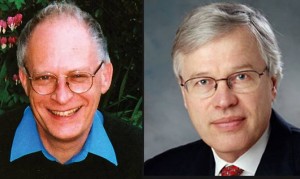Nobel Prize for "contract theory", simple and disastrous
by Luigino Bruni
published in Avvenire on 11/10/2016
 The culture of contracts is the big winner of our time of too many poor on the losers' side. It grew from the ashes of the culture of pacts, which had been the backbone of the family, civil and political edifice of the past generations. Until a few decades ago, the reign of the contract was important but delimited, because much of people's life was ruled by the register of pacts (family, friendship, politics, religion, work...).
The culture of contracts is the big winner of our time of too many poor on the losers' side. It grew from the ashes of the culture of pacts, which had been the backbone of the family, civil and political edifice of the past generations. Until a few decades ago, the reign of the contract was important but delimited, because much of people's life was ruled by the register of pacts (family, friendship, politics, religion, work...).
Pacts and contracts have lived together for many centuries and they were complementary tools for social life. Until the point when the globalization of markets and finance as well as the emergence of an ethos - where each bond is experienced as a snare for the individual - decreed the gradual transformation of all the pacts into contracts. The pact is (was) a community and symbolic fact. It does not originate from the register of personal interest only but has its constituent elements coming from gratuitousness, forgiveness and collective bonds and interests. Weddings, unions, cities, constitutions, work - these were pacts and not contracts; and as long as they "live", they still are. The postmodern individual likes contracts very much because they appear as "human relations without injury", that is, relationships with very low "activation" and "exit" costs that are certainly lower than the costs of the pacts.
And so contract is replacing pact very rapidly in the family, at schools, in health care, in the "labour market", presenting itself as the only truly liberal and civil tool for regulating human relationships, possibly all of them. So upon learning about the rewarding of economists Oliver Hart and Bengt Holmström yesterday, we can understand why the committee for awarding the Nobel Economics Prize explained their choice by saying that their work in contract theory now covers a constantly expanding area, "from bankruptcy legislation to political constitutions."
The economic theory of contracts has in fact now become a universal grammar to design human relations not only in businesses, but also at universities, in politics, and in more and more forms of organizations. The Royal Swedish Academy of Sciences seems to know this very well. But what they may not know, or do not say, is that contract theory is profoundly changing our way of being together in the world, and not for the better. In fact, it conveys a very clear vision of man and an increasingly intrusive and influential ideology which is based on certain dogmatic axioms that are far from being ethically neutral. The main and most powerful one is the theory of incentives, according to which if you pay a human being in an adequate and sophisticated way you can get almost anything from them.
And so all the other non-monetary and not self-interested kinds of motivation of human beings should not be taken seriously because they are neither credible nor reliable. The worker or the citizen - according to this economic theory - does not work well because they attribute a value to work well done in itself, but only if they are appropriately remunerated. And after decades during which economists have continued to think, write, and teach all this, it is more and more difficult to find someone who thinks that the first motivation that drives a person to work well is their work ethic or sense of duty.
A side effect of this newly awarded contract theory is presenting all human relationships as free relationships between equals (as contracts, in fact, are). Therefore, we are living the eclipse of the great theme of power, which is declined as simply a matter of the right incentives. Everything is simple, too simple. A simplistic approach founded on the big weak point of a strong anthropological reductionism, of which contract theory is the highest expression.
The motivational, symbolic, relational and spiritual complexity of people is left in the background. Oversimplified men and women are depicted, real contracts are designed to the measure of these "economic gnomes", and finally we end up also believing that we are really such as the economy sees us - an economy that chases the old utopia of reducing human relationships to a technical matter, and therefore to something ethically neutral, universal and abstract.
And also something useless, if not manipulative. So the real question becomes: are we sure that today, while we continue to pay for the disastrous consequences, it was appropriate to reward the leading representatives of this economic and financial theory, presented as a simple "toolbox"? Perhaps, if we want people to get back on friendly terms with economic theory and economic theory to be proven a friend of the people, we need more humanist and less technical minded economists. Scholars who, if asked the question: "What motivated you to become an economist?" may give similar answers to the one that the great (and forgotten) Achille Loria gave almost a century ago: "Human suffering."







